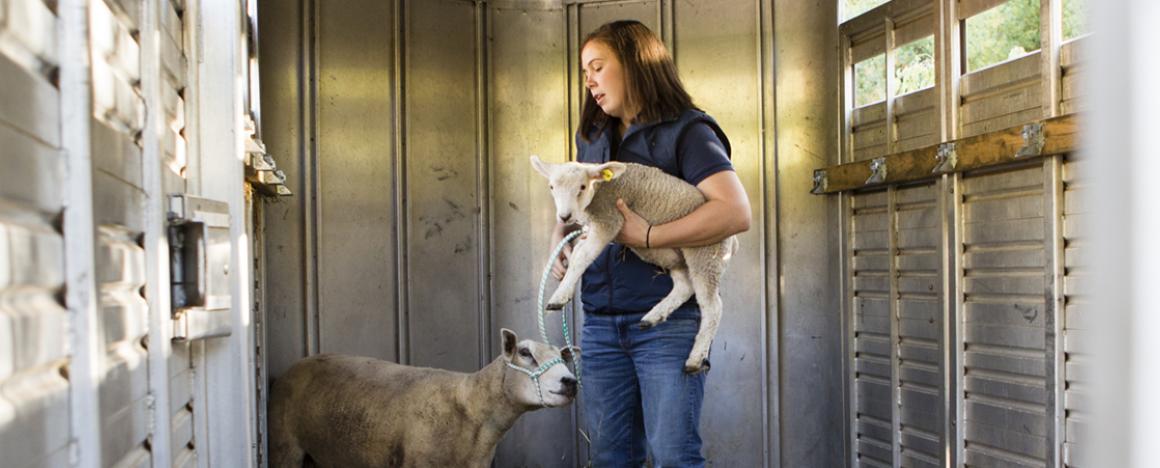Herd/Flock Health & Production Medicine

-
Tufts Veterinary Field Service has a team of veterinarians with vast experience working through many types of herd or flock problems. Small ruminants are commonly plagued with contagious diseases that need to be eliminated from the farm. Some examples include Caprine Arthritis Encephalitis (CAE), Ovine Progressive Pneumonia (OPP), Caseous Lymphadenitis (CLA), foot rot and sore mouth.
Tufts Veterinary Field Service is able to aid a farm in disease prevention and elimination, as well as production performance. A site visit from Tufts Veterinary Field Service will include an interview of farm personnel, and observation of the animals in their environment. Appropriate interventions such as diagnostics or animal husbandry changes will be suggested, and ongoing performance will be measured moving forward to ensure improvement.
Assistance with reproductive performance may be offered such as breeding soundness exams of males and pregnancy diagnosis of females (as early as 30 days via ultrasound). These procedures help owners evaluate their breeding programs and make changes quickly to prevent additional loss.
-
Vaccinations are an integral part of preventing disease in your sheep, goat, llama or alpaca. Rabies and Clostridium Perfringens Types C & D - Tetanus Toxoid (CDT) are considered core vaccines for all small ruminants. There are other vaccines available, but their use is typically customized to individual farms demonstrating necessity.
Rabies is fatal virus that can infect the brain of small ruminants and humans. It is spread when an infected animal bites or scratches an uninfected animal. Rabies is endemic to New England, meaning it is regularly found in wild animal populations and CAN affect small ruminants. Tufts Veterinary Field Service typically treats a few cases of rabies each year. Protection is simple with an annual vaccine administered by a veterinarian. The vaccine can be given to all sheep, goats, llamas and alpacas over 12 weeks of age. Rabies vaccination is required for small ruminants being exhibited at fairs or shows in the states of Connecticut and Rhode Island, but we recommend all that all of our patients are current on this vaccine.
CDT is a well-known acronym that stands for a combination vaccine against Clostridium perfringens types C & D, as well as tetanus. These bacteria live in our soil, as well as in the normal intestinal flora of healthy animals. In the event of Clostridium perfringens overgrowth, your small ruminant may develop a fatal intestinal infection. Tetanus infection can lead to a fatal neuromuscular disease. The use of the CDT vaccine decreases the chance of contracting these diseases significantly. The vaccine is administered twice (one month apart) to weanlings, and then repeated annually thereafter. This schedule works for all small ruminants. Ideally, the annual booster is given to pregnant females approximately 30 days prior to giving birth, to provide protection to the kids through the colostrum.
-
Tufts Veterinary Field Service offers many services regarding the management of reproductive performance, the most popular being pregnancy diagnosis by ultrasound. This allows the veterinarian to look through the abdominal wall of female small ruminants to estimate the number of fetuses, the age of the fetuses and even sometimes the sex of the fetuses. Another popular service, which aids in good reproductive performance, is breeding soundness examinations for males. These can be performed on-farm or in the haul-in facility at the Tufts Veterinary Field Service clinic in Woodstock, CT. These exams allow our veterinarians to determine if a male is fertile and capable of breeding by evaluating him, as well as his semen.
-
Internal and external parasites are common in small ruminants. Veterinarians at Tufts Veterinary Field Service can help tailor a plan to prevent parasitism in your animal. In the event that they infect your animals, Tufts Veterinary Field Service can help diagnose their presence and aid in removal.
Internal parasites are the most commonly discussed parasites of small ruminants because of the Internal parasites are significant causes of disease and death in small ruminants. Haemonchus contortus (Barber pole worm) sucks blood from the stomach of infected animals leaving them anemic, weak, and at risk of death. Small ruminants pass the eggs of this parasite in their manure, and then other ruminants ingest the hatched larvae allowing adult worms to then grow in the stomach of the second infected animal. This occurs most readily in the warm and wet seasons. There are a few things that can be done to monitor animals for the presence of these parasites, as well as the degree of their presence.
The FAffa MAlan CHArt or FAMACHA score is used to identify anemia. Tufts Veterinary Field Service staff are trained to FAMACHA score animals and assist clients to find training opportunities for themselves.
In addition to anemia, it is important for small ruminant owners to recognize other indicators of parasite infestation in their animals. These includes:
- Diarrhea
- Swelling under the jaw (Bottle Jaw)
- Emaciation or failure to grow
- Lethargy
Tufts Veterinary Field Service also offers in-house fecal analysis, which allows same day results. Fecal samples can return to the clinic for analysis with the veterinarian who visits the animal, may be dropped off at the clinic by the owner in-person, or may be mailed in via overnight service to the clinic (on ice) with an indication that the package must be opened immediately.
Tufts Veterinary Field Service’s fecal analysis detects a variety of parasites, and can quantify the load the animal is harboring as well. Results will be delivered to the owner by a phone call from a veterinarian or veterinary technician. Parasite control programs can be customized based on these results. Deworming programs may vary greatly, depending on the individual animal’s history and fecal results. At a minimum, we recommend fecal are performed twice a year, in the Spring and Fall.